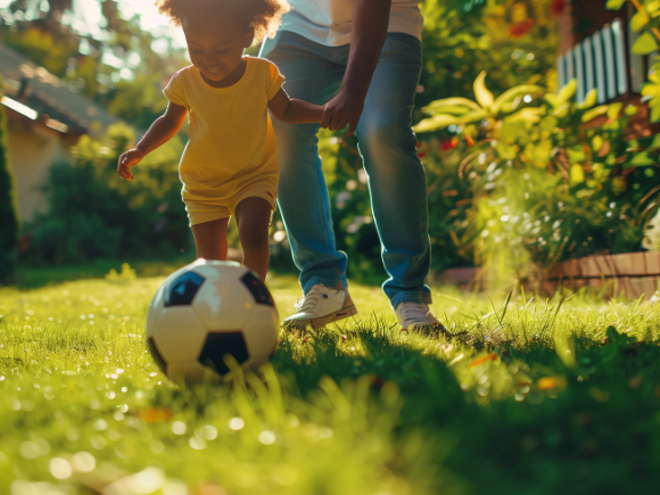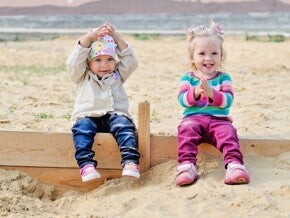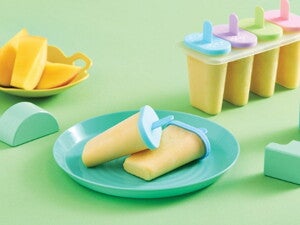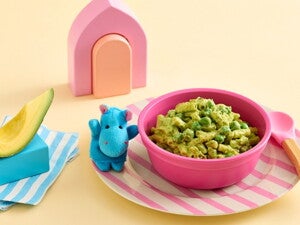
Outdoor Toddler Games to Keep Your Little One Active
Outdoor play is not just a source of fun and excitement for toddlers, it plays an important role in their overall growth and well-being.
The great outdoors offers a vast and stimulating environment that engages your child’s senses, enhances their physical development, and nurtures their cognitive and emotional skills. Beyond the benefits to their individual growth, outdoor play also provides an excellent opportunity for child-parent bonding. Exploring nature together, engaging in imaginative play, and experiencing the wonders of the world outside strengthens the bond you have with your little one.
The benefits of outdoor games for toddlers and preschoolers
It’s no secret toddlers love to play! Play is a fundamental aspect of a toddler's development, providing so many benefits that contribute to their holistic growth and well-being. Outdoor play can:
- Enhance cognitive and motor skills
- Foster social and emotional development;
- Have a positive impact on sleep and appetite.
Different types of games can target various developmental milestones and allows your toddler to explore their interests and surroundings. Through playful activities, children engage their senses, explore their surroundings, and learn about cause and effect. This hands-on exploration helps them develop problem-solving skills, creativity, and imagination.
Toddler games for cognitive skills
Activities such as building blocks, solving puzzles, and engaging in pretend play require toddlers to think, plan, and execute actions. As a result, their attention span, memory, and language skills, are strengthened.
Toddler games for motor skills
Physical play, such as climbing, jumping, and running, helps toddlers develop their gross and fine motor skills, coordination, and balance.
Toddler games for social skills
When children engage in play with peers or caregivers, they learn crucial social skills, such as sharing, taking turns, and cooperating.
Toddler games for emotional skills
Play also offers opportunities for toddlers to express emotions, develop empathy, and practice problem-solving in social contexts. Through play, toddlers build self-confidence, resilience, and the ability to navigate social interactions.
Outdoor toddler game ideas
As your toddler continues to grow, engaging them in fun and educational games is an excellent way to support their learning journey. These games not only provide entertainment but also foster essential skills such as problem-solving, creativity, and motor development. There are loads of different games and activities you can do with your toddler that are both fun and educational, here are a few interactive games that can boost your toddler's learning:
Sensory games for outdoor play
![]()
- Memory match: Enhance your toddler's vision and concentration with a memory matching game. Use cards or pictures and challenge them to find the matching pairs.
- Sensory garden: Set up a sensory garden with various plants and flowers for your child to touch and smell. Create a sensory pathway using different materials like grass, sand, and pebbles to stimulate their sense of touch and balance.
- Grocery shop: A daily chore can easily become a toddlers most exciting outing. Get them to look for the fruits and vegetables on your shopping list. Let them feel the skin, the weight, describe the shape, and when you get home cut some up for a healthy snack so they can explore the taste and texture of different foods in their mouth.
Educational outdoor games
![]()
- Shape sorter: Introduce your child to shapes using different materials in nature. Find different shaped leaves, flower petals and stones. This game builds cognitive skills as they learn to recognise and match different shapes.
- Scavenger hunt: Provide your toddler with a list of things they need to find in the outdoors. You could be broad and use descriptors like ‘find something blue, something heavy, something soft’ etc. Or you could be specific with descriptors such as ‘find a red flower, a large leaf, a seat’ etc. This game strengthens their task following skills and even their imagination and influencing skills as they need to explain how the item they found fits the description you’ve given them.
- Counting games: Teach your toddler numbers through counting games. Use toys, blocks, or even fingers to count together and make it a fun learning experience.
Fun outdoor games for motor skill development
![]()
- Obstacle course: Create a mini obstacle course using rocks, steps, and tunnels. This game promotes gross motor skills as your toddler crawls, climbs, and navigates through the course.
- Hopscotch: Use chalk or tape to mark out the lines for a hopscotch course on the sidewalk or driveway. This game encourages counting, hand-eye coordination, and balance to hop to the end.
- Building blocks: Set up building blocks and encourage your toddler to stack them to create towers or other structures. The building blocks could even be something they have to find in the garden first, such as stones, pieces of wood, or buckets. This activity helps improve hand-eye coordination and fine motor skills.
Gardening toddler games and activities
![]()
- Planting seeds: Get your little one to choose which plants they want to grow and show them how to pot them and take care of them with food, water and sunlight. The excitement they experience seeing them grow is priceless. They’ll learn cause-and-effect, as well as how plants grow. They’ll have an added reward if they choose seeds that grow into a fruit or vegetable they can eat!
- Watering plants: As simple as this sounds, giving your little one the responsibility to water the plants will help with gross motor skills and strength, but also hand-eye coordination when aiming for the plants. This could have an added benefit of water play in hot weather.
- Observing insects: Learning to identify and respect all things in nature will help your little adventurer be mindful of all living things when they’re running around in the outdoors. Watching and describing how different insects fly, crawl, jump or squirm is a fantastic educational game.
Classic outdoor games for toddlers
![]()
- Pretend play: Encourage your toddler to engage in pretend play, such as playing house or pretending to be a fire fighter. This helps them develop social skills, expand their imagination, and learn about different roles and responsibilities.
- Hide-and-seek: Who doesn’t remember the hours of fun as a kid playing this with friends and family, at home or in the park. This is a great game for exercise and to encourage social interaction with other kids, or a great bonding activity with mum, dad or siblings.
- Art and craft: Provide your toddler with outdoor chalk and let them go wild on a blank cement canvas (i.e. The sidewalk or driveway). Collect materials from the outdoors to take inside and let them explore their creativity by drawing, painting, and making simple crafts out of them. This is great for developing fine and gross motor skills.
Remember, the most important aspect of these games is to make them enjoyable and age-appropriate for your child. By incorporating these fun and educational games into your daily routine, you can support your child's growth and development while creating lasting memories together.
Safety considerations for outdoor play
Ensuring your toddler's safety during playtime is paramount. By creating a safe play environment, choosing age-appropriate games, and providing adequate supervision and interaction, you can make playtime both enjoyable and safe for your child.
Creating a safe play environment:
Before your toddler starts playing, it's crucial to create a safe space. Be mindful of the surroundings they are playing in when outdoors. Bodies of water, high climbing equipment, open areas for dogs and other animals, are all potential hazards for your little one. Check play equipment and ensure they are in good working order with no broken pieces. Additionally, ensure they have sun protection during times of high UV exposure.
Choosing age-appropriate games:
Select outdoor activities designed for preschoolers which promotes their physical, cognitive, and social development. Age-appropriate games will not only keep your child engaged but also help them learn and grow.
Supervision and interaction during play:
While your toddler is playing, provide supervision at all times. Stay nearby to ensure their safety and offer guidance when they need you. Join in play with them, as this not only strengthens your bond but also encourages their development and learning.
Incorporating fun outdoor game time into the daily routine
Incorporating more outdoor game time is not always going to be easy. Considering the outdoor elements and weather, with existing busy schedules will at times take some juggling. However, the developmental benefits make it all worth the effort. Here are some tips on how to integrate outdoor play ideas into daily schedules:
- Set aside dedicated outdoor playtime in your daily schedule.
- Make outdoor play a regular part of your routine, such as in the morning or afternoon.
- Explore nearby parks, playgrounds, or nature trails for variety and new experiences.
- Incorporate outdoor play into everyday activities, like going for a walk or playing in the backyard.
- Encourage unstructured play to foster creativity and imagination.
- Provide age-appropriate toys and equipment for outdoor play, such as balls, sand toys, or bikes.
- Join parent-child outdoor playgroups or organise playdates with other families.
- Embrace different weather conditions and dress your toddler accordingly for outdoor adventures.
- Limit screen time and prioritise outdoor play as a healthy alternative.
- Take advantage of natural learning opportunities outdoors, such as observing plants, animals, and the changing seasons.
- Enjoy the benefits of child-parent bonding by actively engaging and participating in outdoor play with your toddler.
Most importantly, consistency will be key for routine building, and to reap the rewards of outdoor play. Having a variety of games and rotating them will help maintain engagement and prevent boredom. Also having a mix of active and quiet games will help balance your little one’s energy levels. Stay patient when the plan doesn’t always work out, seek support when needed, and trust your instincts as a parent.
Outdoor games is a great bonding opportunity
Use outdoor playtime as an opportunity for bonding and creating lasting memories with your little one. It enriches the play experience and nurtures your little one’s development, making outdoor playtime a cherished and meaningful shared activity. It strengthens your bond, fosters a sense of security, and enhances communication and trust by providing guidance, setting boundaries, and encouraging creativity and imagination. By actively participating, you can teach them about rules, and provide them with support and encouragement. You are also modelling acceptable behaviour when it comes to problem-solving and social interaction.
Frequently asked questions about toddler games
How do I entertain my 2 year old outside?
There are so many ways to entertain your 2-year-old outside. Try to engage them in sensory play with sand, water, or nature objects; or support their gross motor skills and fitness through running, jumping, or playing with balls. Explore nature, go on nature walks, or create simple outdoor scavenger hunts. Foster imaginative play with dress-up clothes or involve them in gardening or simple outdoor art activities like sidewalk chalk.
What are the physical outdoor activities for toddlers?
Physical outdoor activities for toddlers can include running, jumping, climbing on playground structures, riding tricycles or balance bikes, playing catch, kicking a ball, exploring nature trails, and engaging in water play. These activities promote gross motor skills, coordination, and overall physical fitness in a fun and engaging way. Joining in and doing the activities with them also creates a great bonding experience for you and your little one, as well as working on your fitness which is a bonus!
How long should a 2 year old play outside?
A 2-year-old should ideally have at least 3 hours of playtime each day, making sure to include some energetic play during this time. Outside activities for 2 year olds offer so many advantages so it’s important to try and incorporate outside play as much as it suits you, your child, and your daily routines. The duration over each day can vary depending on your child's energy levels, interests, and the weather conditions. Pay attention to your child's cues and ensure they have a balance of active play, rest, and other activities throughout the day.
Should toddlers go outside every day?
Yes, toddlers should ideally go outside every day, weather and other obligations permitting. Outdoor play offers numerous benefits for their physical, cognitive, and emotional development. It provides opportunities for exploration, sensory experiences, and social interactions. Fresh air, natural light, and nature's wonders contribute to their overall well-being and holistic growth.
Sources:
- Australian Government Department of Health and Aged Care website. Accessed at https://www.health.gov.au/topics/physical-activity-and-exercise/physical-activity-and-exercise-guidelines-for-all-australians/for-infants-toddlers-and-preschoolers-birth-to-5-years
- Australian Institute of Family Studies website. Accessed at https://aifs.gov.au/resources/practice-guides/engaging-young-children-0-5-years-nature-play
- Raising Children website. Accessed at https://raisingchildren.net.au/toddlers/play-learning/outdoor-play/outdoor-play





